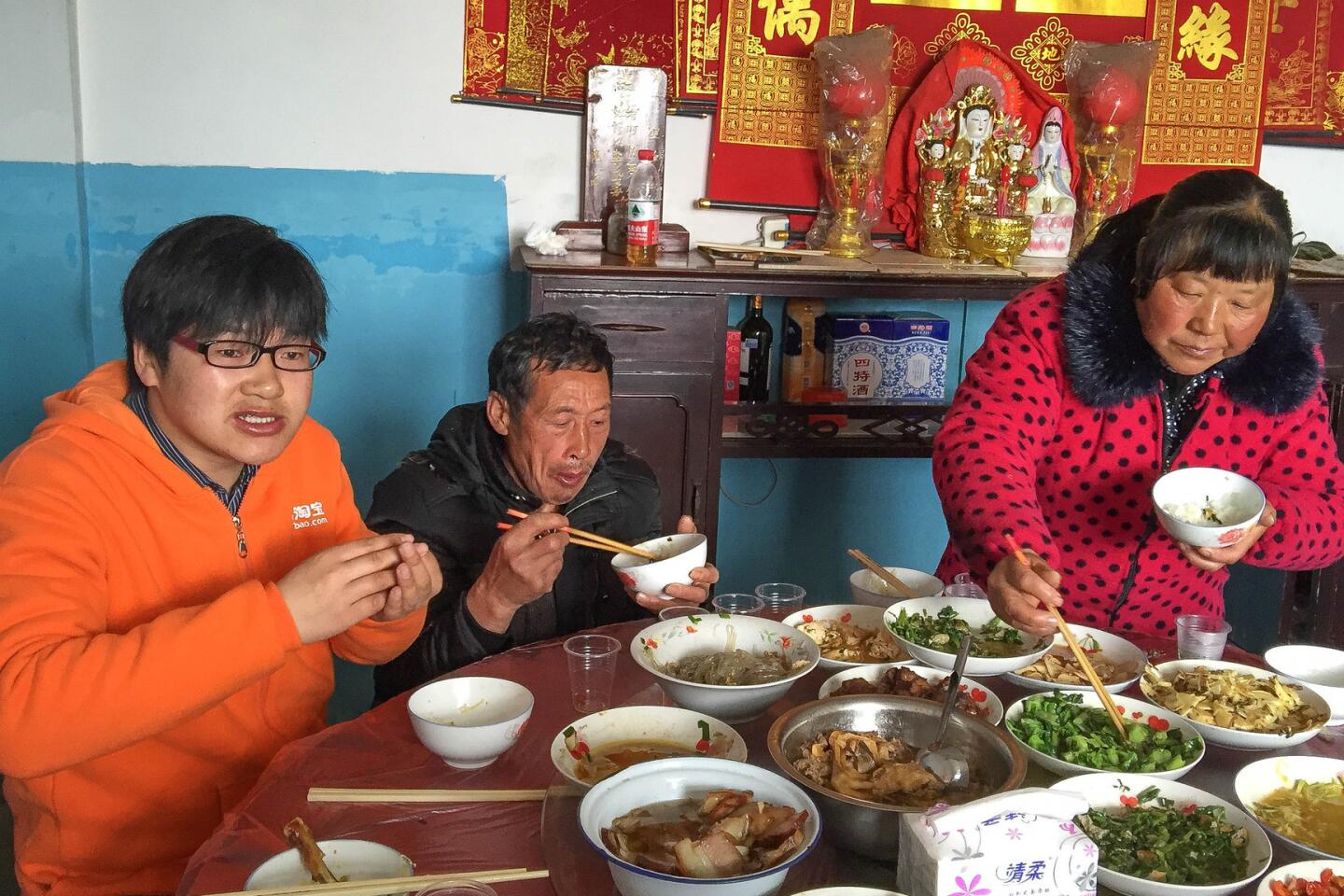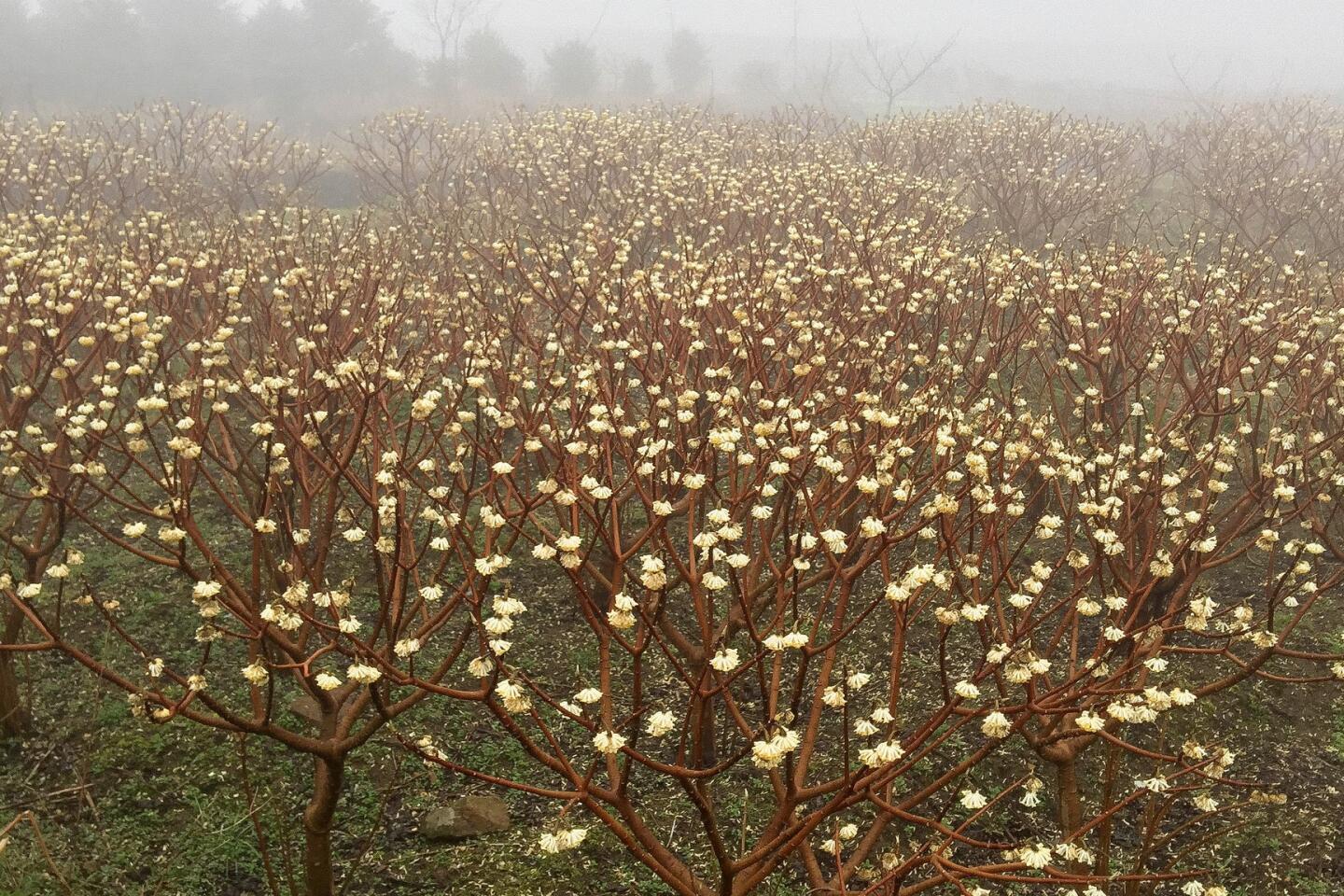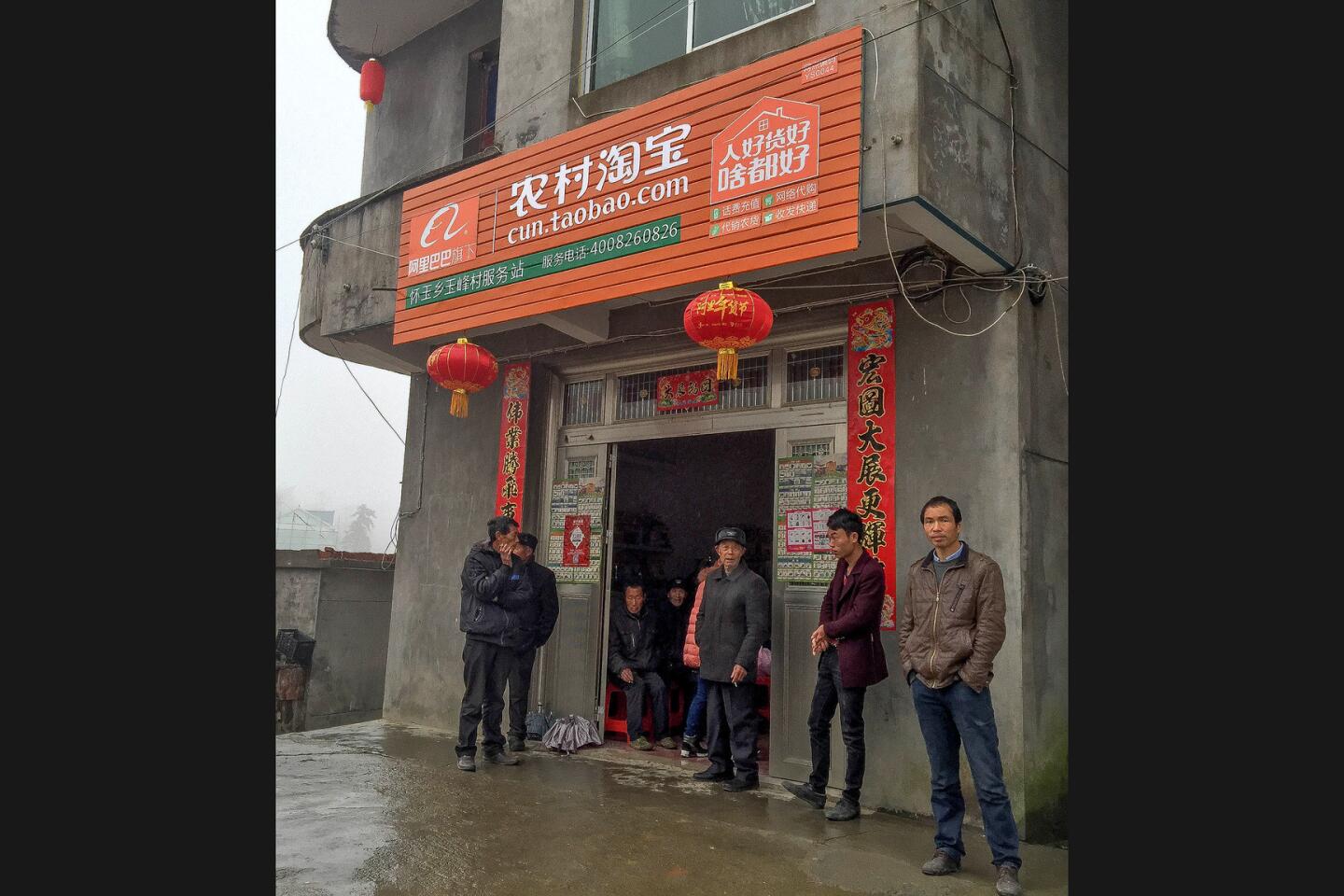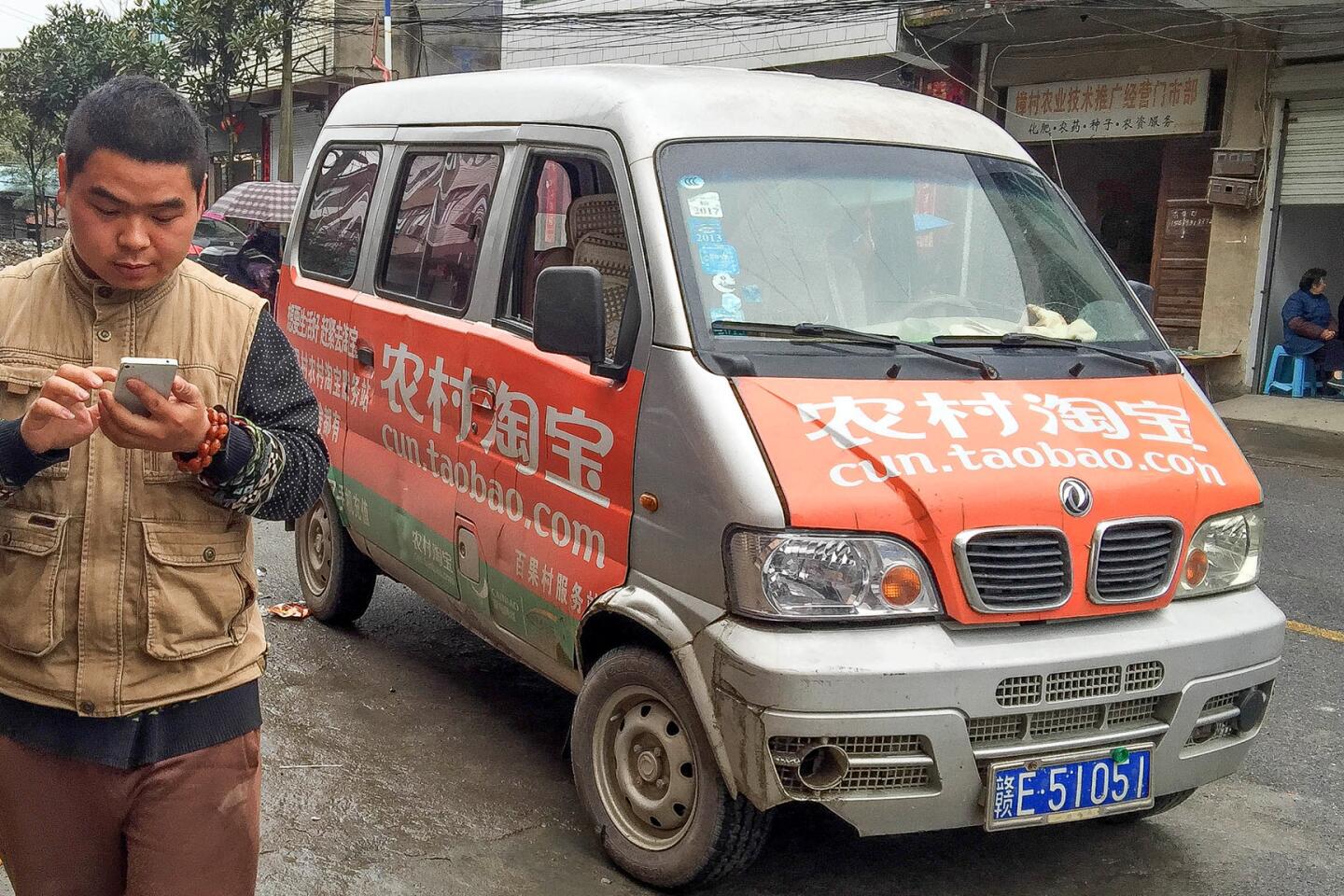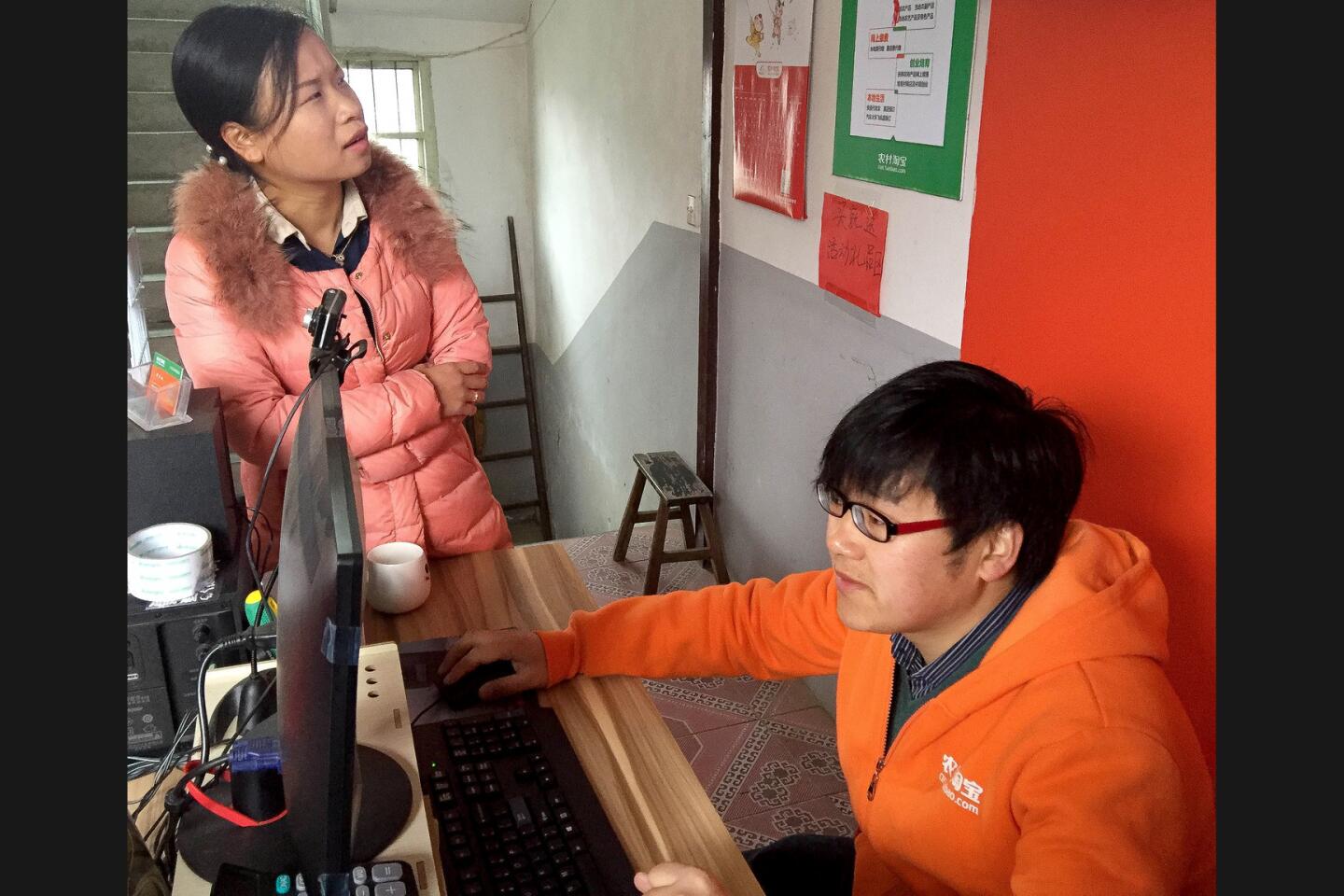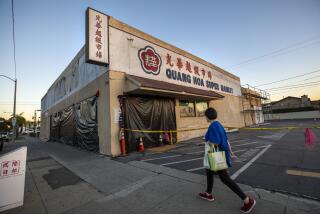Chinese e-commerce giant Alibaba connects rural residents to online shopping
- Share via
Reporting from YUFENG, China — Last fall, 30-year-old Luo Rong quit his $30,000-a-year engineering job in Shanghai, moved back to his mountaintop village of Jade Peak with his wife and newborn baby and opened a shop with a big orange and green sign out front.
The store is thinly stocked. There are a few packages of seeds, Skittles candy, some sweaters, sneakers and laundry soap — but no lack of customers.
The main draw is Luo’s computer and the big-screen display perched above him on the wall — both provided by the Chinese e-commerce giant Alibaba. From 7:30 a.m. to 11 p.m., breaking only for meals at his parents’ house, Luo pecks away at his keyboard, helping his technology-challenged neighbors buy fertilizer, TVs and even electric cars on an Alibaba shopping site called Rural Taobao. Luo arranges the payments, as well as delivery to Jade Peak, and earns a commission from the sellers.
“This is going to change the whole village,” said Luo Laibing, a 56-year-old farmer who stopped by on Tuesday to purchase more than 1,000 pounds of fertilizer. “It’s saving us money and time, and is making life much more convenient.”

Rural Taobao is an ambitious effort by Alibaba to turn China’s 600 million rural residents into online shoppers — and sellers — at a time when the company’s growth in transactions is slowing and China’s overall economic growth has ebbed to a 25-year
Rural Taobao is an ambitious effort by Alibaba to turn China’s 600 million rural residents into online shoppers — and sellers — at a time when the company’s growth in transactions is slowing and China’s economic growth has ebbed to a 25-year low. In the last year and a half, the company has enlisted more than 15,000 village “partners” like Luo Rong and hopes to have at least 40,000 by this time next year. Alibaba says it plans to invest $1.6 billion in the effort through 2019, with the ultimate goal of opening 100,000 Rural Taobao centers.
But the company is hardly going it alone. It’s getting a big helping hand from the government, which is footing the bill to renovate storefronts like Luo’s, sending officials out to talk up e-commerce to skeptical farmers, providing gratis space for new logistics centers and deploying propaganda workers to promote Rural Taobao.
The ministries of commerce and finance have allocated $300 million to 200 rural counties to spend on warehouses, training and anything else that might push the project forward.
See more of our top stories on Facebook >>
While it’s inconceivable that Uncle Sam would offer such assistance to, say, EBay or Amazon, China’s Communist Party leaders see no problem working hand-in-glove with a company like Alibaba when it suits national aims. Government officials and Alibaba executives say Rural Taobao jibes neatly with national goals such as boosting consumer spending to fuel economic growth, narrowing the income gap between urban and rural citizens, promoting entrepreneurship and harnessing the power of the Internet to invigorate backward regions.
And while China is still expecting an additional 200 million or so people to move from the countryside to its burgeoning cities, the government is aware that it can’t urbanize everyone.
“The success of rural e-commerce throughout China is due to the top-to-bottom concern from the government … starting from the president and the premier down to lower-level officials and departments,” Sun Lijun, general manager of Rural Taobao, said in an interview at one of Alibaba’s modern campuses in the city of Hangzhou. “We have 300 counties participating so far, and when we send in one Alibaba employee, the government deploys 10 people.”
The outside world
As the crow flies, Jade Peak is just 165 miles southwest of Hangzhou, which has a population of 8.8 million, but the big city and its modern conveniences have long been a world away for the hamlet’s 800 residents. The village is so insular, many inhabitants share the same surname, Luo, and some are illiterate. They get by raising potatoes, lotus, medicinal herbs and chickens in the fog-shrouded fields up in the mountains of Jiangxi province.
Until last year, a trip to buy something as basic as a faucet meant an all-day expedition to the nearest township, given that bus service over a steep dirt track ran just twice day. A voyage to the more distant county seat required three hours each way. Given Jade Peak’s small population and remote location, no package delivery company would serve the village. Many of Jade Peak’s youth, like Luo Rong, decamp for urban centers, in search of opportunity and modernity.
But the completion of a new highway, a 1.6-mile tunnel and a winding asphalt road up the mountain last year are starting to change life in Jade Peak. Travel times to the nearest township have been halved, and more sightseers eager for a day trip to the countryside are finding their way to the village. Package delivery firms — enticed by subsidies from Alibaba — are now making the trek up on a near-daily basis. Alibaba’s logistics arm makes sure the deliveries are optimized for maximum efficiency.
Luo Bishui, 60, used to just grow potatoes, but now he’s opening an eight-room guesthouse for tourists. This week, he popped into the Rural Taobao center to order two more flat-screen TVs for his rooms. Such transactions generate about $770 per month in commissions for Luo Rong, though he made double that in November, his first month on the job, and gets performance bonuses from Alibaba as well.
NEWSLETTER: Get the day’s top headlines from Times Editor Davan Maharaj >>
Although he earned more in Shanghai, his money goes much further in Jade Peak.
Already, Luo Rong has plans to move his storefront into a bigger space, which the government will pay to renovate. Rent will be about $500 a year. He envisions adding more services, including printing, copying and video-conferencing, so elderly parents in Jade Peak can chat with their sons and daughters who have moved to big cities.
“Next I want to help sell our local products like potatoes and smoked meat online,” said Luo Rong. “It’s long been my dream to contribute to the development of my village.”
He’s got neighbor Luo Laizhang, 45, selling eggs online; now, the two are trying to figure out how they can market the farmer’s special breed of black chickens. “We have to figure out the slaughtering, packaging and transport,” says Yuan Chunjiang, Rural Taobao regional manager for the eastern part of Jiangxi province. “It’s a bit complicated.”
But local Commerce Bureau official Zheng Zeyang believes there’s a huge untapped customer base for such products. “There is lots of demand from cities for organic produce, and Rural Taobao can get sellers good prices,” he said, touring Jade Peak with a photographer from the propaganda department in tow. “Online sales offer more opportunity to sell outside of the hometown market.”
Local businesses
About an hour’s drive away in a village called Baiguo, or 100 Fruits, Qiu Chuan, 28, dons a beekeeper’s hat and helps his dad lift some honeycomb frames from the family’s hives. His mother cuts away some of the comb, then places the frame in a spinning contraption that extracts the honey from each little crevice.
Two years ago, Qiu started selling his family’s honey online. Although he has only a middle school education, his e-commerce savvy made him ideal for the Rural Taobao program, said Yuan, and last year Qiu opened a Rural Taobao storefront in Baiguo.
In addition to helping villagers buy things online, Qiu has started selling his neighbors’ produce over the Internet. He drives around in his tan van, plastered with Rural Taobao logos, collecting ginger and sweet potatoes.
If the villagers sell their ginger in the township, Qiu said, they can get about 27 cents for 18 ounces. He pays about 42 cents for that amount, and sells the same quantity online for 64 cents.
While Rural Taobao is helping farmers sell their produce at higher prices and buy things more cheaply, the introduction of the platform has not been without its effects on local brick-and-mortar stores, Yuan acknowledges.
When Jade Peak’s farmers found they could buy fertilizer online for about two-thirds of the price they were paying in the nearby township, the local supplier cut his price and renegotiated with his supplier. It is part of Yuan’s job to travel around the county and try to manage the frictions that arise. In the case of the local fertilizer dealer, he helped that business start selling online so it could expand its customer base.
Luo Rong says he keeps the peace with the small convenience stores in Jade Peak by focusing his sales on products they don’t offer. As for Qiu, he says he’s won over local shopkeepers by helping them order products online to resell in their stores.
There is great room to grow e-commerce in rural areas, Alibaba believes. Of the 600 million rural Chinese, only 77 million shopped online in 2014, according to data from the China Internet Network Information Center. In the first quarter of 2015, less than 10% of online purchases made through Alibaba platforms were shipped to rural areas.
Once consumers become Rural Taobao customers, Alibaba will have the opportunity to offer them a wide variety of services, including loans through its affiliate Ant Financial and financial services including interest-bearing accounts. At headquarters, Alibaba has 600 full-time employees devoted to the program now, and will increase that to 1,000 this year.
Sun would not say whether Rural Taobao was making money yet.
“We are not considering profits now; we are not doing those calculations,” he said. “Right now we are just investing a lot in logistics, in hardware.”
Sun, who grew up in a small village near Hangzhou called White Ox, says the ultimate aim is to eliminate the urban-rural gap in opportunities, incomes and conveniences.
“Many people will return home to be part of this,” he predicts. “I see this as a revolution.”
Twitter: @JulieMakLAT
Nicole Liu in The Times’ Beijing bureau contributed to this report.
ALSO
Some political candidates in India must prove they use a toilet
Some prominent Chinese are chafing against censorship. Then their complaints are censored
North Korea and friction in the South China Sea complicate Obama’s ‘rebalance’ toward Asia
More to Read
Sign up for Essential California
The most important California stories and recommendations in your inbox every morning.
You may occasionally receive promotional content from the Los Angeles Times.
